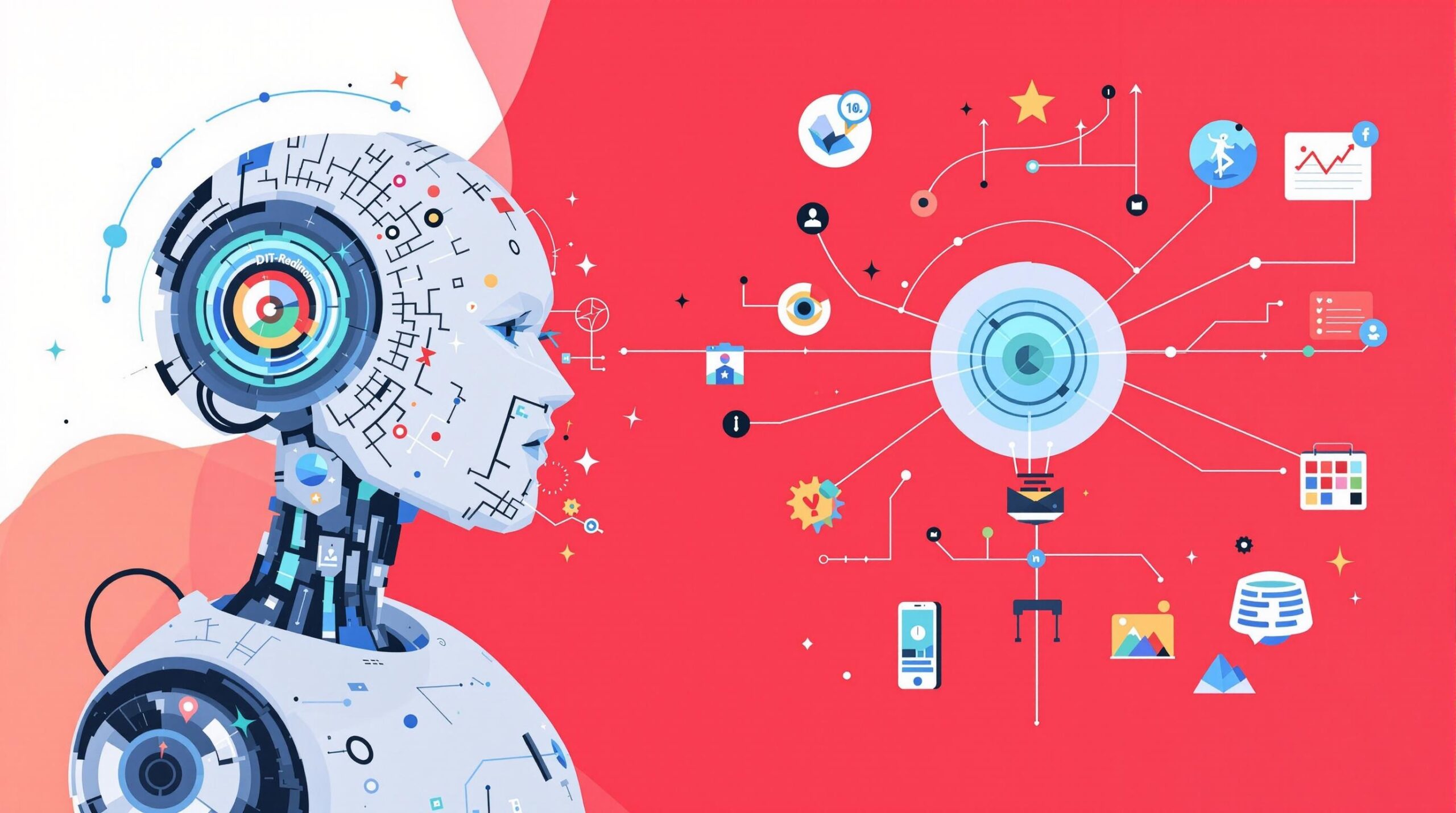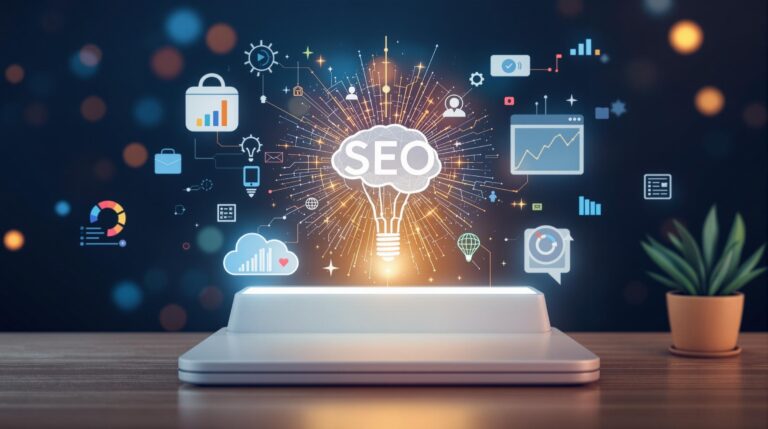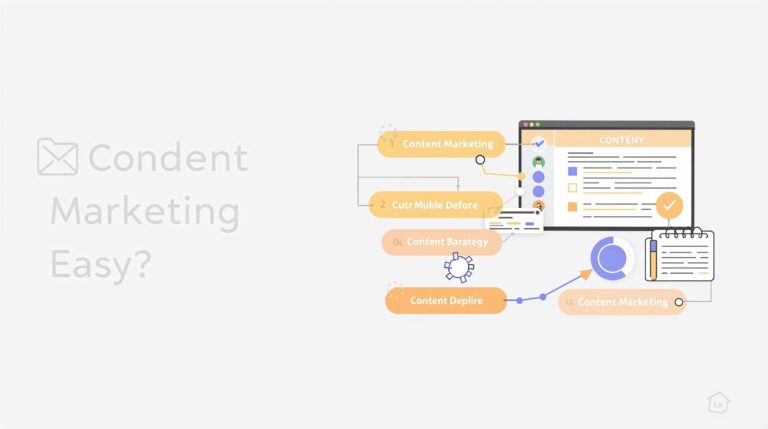How AI is Transforming Content Marketing in 2025
AI content marketing is rapidly evolving, transforming how brands create and distribute material across digital channels. In 2025, we’re witnessing unprecedented integration of artificial intelligence into content strategies, with tools that not only generate text but also personalize experiences and predict consumer behavior with remarkable accuracy.
Key Takeaways:
- 78% of marketers report quality improvements using AI content tools
- AI-driven content strategies deliver 68% higher ROI than traditional approaches
- By late 2025, generative AI will produce 40% of all marketing content
- Successful brands are adopting hybrid human-AI workflows rather than full automation
- Voice search optimization and zero-click results are reshaping SEO priorities
The Revolution in AI-Generated Content
The content marketing landscape has undergone a dramatic shift as AI tools become mainstream for marketers across industries. According to Digital Silk, 78% of marketing professionals report moderate to significant quality improvements when using AI content tools in their workflows. The efficiency gains are equally impressive – 86% of professionals save at least an hour daily through content marketing automation for tasks like drafting (47% adoption rate) and editing.
What’s particularly interesting is how companies are implementing these tools. While 46% use AI for marketing copywriting, only 14% publish AI-generated content without human edits. This highlights the emerging best practice of collaborative content creation – using AI to generate drafts and ideas while relying on human creativity and judgment to refine the output.
Real-world examples demonstrate the scale of this transformation. The Washington Post published over 850 AI-assisted stories during major events, while bloggers using AI have reduced their writing time by 30% according to Siege Media. By integrating content automation solutions into existing workflows, brands can maintain quality while dramatically increasing their output.

Strategic Personalization: AI Scaling the Individual Experience
Beyond content creation, AI is revolutionizing how brands personalize their marketing. Three in five consumers now prefer AI-enhanced shopping experiences with tailored interactions that feel relevant to their needs. This preference isn’t surprising when we look at success stories like Netflix, whose recommendation engine drives 80% of viewer engagement through AI-powered content suggestions.
Similarly, Spotify’s Discover Weekly playlists boost retention via collaborative filtering that analyzes listening patterns. These personalization strategies aren’t limited to media platforms – tools like Adobe Experience Cloud and HubSpot enable adaptive email campaigns with 20% higher engagement rates.
The financial impact is clear: AI-driven personalization strategies yield 68% higher content marketing ROI compared to generic approaches. This is achieved through sophisticated techniques like:
- Behavioral segmentation that tracks user actions across touchpoints
- Psychographic profiling based on values and interests
- Dynamic content adaptation in real-time
- Predictive next-best-action recommendations
Major brands like Coca-Cola are already implementing these approaches, using AI for dynamic ad visuals adjusted by region to create more relevant content experiences for different audience segments.
Analytics and Prediction: The End of Marketing Guesswork
One of the most transformative aspects of AI in content marketing is the shift from intuition-based decisions to data-driven strategies. According to Digital Silk, 36% of marketers now leverage AI for analytics, with tools like Salesforce Einstein forecasting trends and identifying opportunities before they become obvious.
These predictive models deliver measurable results, increasing campaign effectiveness by 6.2% in sales while simultaneously lowering costs by 7.2%. Platforms like Marketo Engage can identify top-performing content types early in campaigns, allowing for rapid optimization rather than waiting for final results.
A case study from Neil Patel demonstrates this approach in action: AI localized over 200 pages for Universal Technical Institute, dramatically improving SEO rankings through data-driven content adjustments. This represents a fundamental shift from reactive to proactive marketing strategies based on AI predictions.
The combination of behavioral data with real-time optimization is creating unprecedented campaign accuracy. Marketers can now predict which content formats will resonate with specific audience segments before investing significant resources, reducing waste and improving performance.
Search Evolution: Beyond Traditional SEO
The search landscape is evolving rapidly, with 67% of small businesses now using AI for SEO optimization according to Siege Media. This adoption is driven by changing search behaviors – notably that 58.5% of searches are now “zero-click,” meaning users get answers directly in search results without visiting websites.
This trend necessitates a focus on featured snippets and AI-optimized content that directly answers user questions. Google continues to prioritize content quality over creation method, with penalties for low-quality AI content that doesn’t provide value.
We’re also seeing the rise of “search everywhere optimization” – extending SEO principles beyond Google to platforms like:
- Amazon product searches
- Reddit discussion forums
- Voice assistants like Alexa and Siri
- Video platforms with search functions
Tools like BrightEdge are enabling intent-driven keyword analysis to help brands understand not just what users are searching for, but why. Voice search optimization and video SEO are becoming dominant content formats, with brands adapting their AI-driven content strategy to these new discovery methods.
The AI Content Toolkit: Essential Applications for 2025
The market for AI content tools has exploded, with solutions targeting every aspect of the content lifecycle. Dumpling AI offers comprehensive capabilities including CRM integration, real-time optimization, and multilingual support for global brands implementing content marketing automation.
Sentiment analysis has become increasingly sophisticated, with tools like Clarabridge and Brandwatch offering advanced monitoring across social media and other channels. Customer service automation has also advanced significantly – Zendesk Bots now automate 85% of customer interactions, with companies like Photobucket reporting 14% faster response times.
Usage patterns reveal different applications for different tools. ChatGPT (with 14.6 billion visits) is primarily used for ideation and initial drafting, while QuillBot (1.1 billion visits) focuses on editing and refinement. The integration capabilities between these AI tools and existing marketing technology stacks have become critical for seamless workflows.
For retailers and e-commerce brands, inventory management tools like LEAFIO AI reduce forecasting labor while ensuring content promotes the right products at the right time. This demonstrates how AI content marketing extends beyond just creating material to optimizing the entire customer journey.
The Human-AI Partnership: Finding the Right Balance
Despite the capabilities of AI, the most successful content strategies maintain a balance between automation and human insight. While 42% of leaders outsource content creation to AI according to Digital Silk, this raises legitimate concerns about job displacement and quality control.
Hybrid teams are emerging as the optimal approach: AI handles analytics and initial content generation while humans refine strategy and provide creative direction. This partnership mitigates the risks of “hallucinated” facts in unedited AI content that could potentially damage brand credibility.
Google’s penalties for low-quality AI content are driving higher editorial standards, with the most successful brands combining AI efficiency with human creativity and oversight. This requires transparent AI use disclosure and clear guidelines for when human intervention is needed.
The future isn’t about replacing human marketers but augmenting their capabilities. Continuous training of both AI systems and human teams ensures the partnership evolves effectively, with each side contributing its unique strengths to the content creation process.
Implementation Roadmap: Adopting AI Without Disruption
For organizations looking to integrate AI into their content workflows, a structured approach minimizes disruption while maximizing benefits. The first step is assessing current content processes to identify automation opportunities where AI can add immediate value.
Next comes evaluation of AI tools based on specific organizational needs and content types. Not all solutions are equal – the right platform depends on your industry, audience, and existing technology stack. Testing methodologies should compare AI-generated content performance against traditional approaches using clear metrics.
Training requirements for marketing teams are often underestimated. Effective collaboration with AI tools requires new skills and mindsets, with marketing professionals learning to become effective “AI whisperers” who guide these tools toward optimal outputs.
Budget considerations should account for the complete picture: while AI tools require initial investment, they deliver 68% higher ROI on content marketing activities according to Miller Media. A timeline for gradual implementation with benchmarks for measuring success ensures organizations can track progress and make adjustments as needed.
Future Horizons: Where Content Marketing Is Heading
Looking ahead, several trends will define AI content marketing through 2025 and beyond. Voice search optimization will require more conversational content development as smart speakers and voice assistants continue gaining popularity.
Zero-click searches are pushing brands to prioritize answer-focused, E-E-A-T-aligned content that demonstrates expertise and authority. Meanwhile, augmented reality experiences are being integrated into content marketing strategies, creating immersive interactions that traditional content can’t match.
Video generation tools are transforming video marketing accessibility for smaller brands, democratizing what was once an expensive content format. We’re also seeing increased content adaptation for emerging platforms and formats as the digital ecosystem continues to expand.
Perhaps most importantly, transparent AI usage and authentic brand voice are becoming competitive differentiators. As AI-generated content becomes ubiquitous, brands that maintain a distinctive voice while leveraging AI capabilities will stand out. Ethical AI usage is no longer optional – it’s becoming a core component of brand identity in the AI-driven marketing landscape.
Sources
digitalsilk.com – Content Marketing Statistics
contentgrip.com – Future AI Marketing
dumplingai.com – 10 Top AI-Powered Content Creation Tools in 2025
millermedia7.com – AI-Driven Personalization Transforming Marketing Strategies






